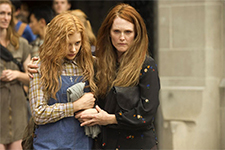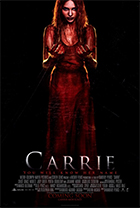Carrie (2013)
|  “What’s the point?” is a question that typically hangs over each new film coming off the now-decade-spanning assembly line of ’70s and ’80s horror film remakes, and it felt particularly dominant in my mind as I approached Kimberly Peirce’s new version of Carrie. Given that Brian De Palma’s 1976 adaptation Stephen King’s first novel is a genuine classic (not just of the horror genre, but of American filmmaking in general), a masterful, aesthetically entrancing teen satire that is also a deeply moving evocation of the pains of adolescence and a horrific depiction of repressed rage unleashed, it is hard to imagine what Peirce (Boys Don’t Cry, Stop-Loss) thought she could improve upon or add. As it turns out, there is nothing to improve upon (she eliminates all those glorious long takes and tracking shots in favor of a style much more prosaic, although she does try to imitate De Palma’s dreamlike deployment of slow motion), and all that has been added are the modern elements of smart phones and YouTube, which are now constituent elements of teen bullying, but do very little to enhance the emotional brutality of the film’s high school sadists. “What’s the point?” is a question that typically hangs over each new film coming off the now-decade-spanning assembly line of ’70s and ’80s horror film remakes, and it felt particularly dominant in my mind as I approached Kimberly Peirce’s new version of Carrie. Given that Brian De Palma’s 1976 adaptation Stephen King’s first novel is a genuine classic (not just of the horror genre, but of American filmmaking in general), a masterful, aesthetically entrancing teen satire that is also a deeply moving evocation of the pains of adolescence and a horrific depiction of repressed rage unleashed, it is hard to imagine what Peirce (Boys Don’t Cry, Stop-Loss) thought she could improve upon or add. As it turns out, there is nothing to improve upon (she eliminates all those glorious long takes and tracking shots in favor of a style much more prosaic, although she does try to imitate De Palma’s dreamlike deployment of slow motion), and all that has been added are the modern elements of smart phones and YouTube, which are now constituent elements of teen bullying, but do very little to enhance the emotional brutality of the film’s high school sadists.On a narrative level, Peirce’s Carrie is almost an exact retread of De Palma’s film, playing out many of the same scenes beat for beat and line for line (Lawrence D. Cohen, who wrote De Palma’s adaptation, is credited as the first screenwriter, while the second screenwriter is Roberto Aguirre-Sacasa, writer/producer for the TV series Glee). We get a new opening sequence, which depicts the birth of poor Carrie White to her mentally deranged, religiously fanatical mother, who is unaware that she is pregnant and thinks that she’s dying from cancer (her almost decision to kill the newborn baby with a particularly wicked pair of scissors is the movie’s one moment of real breath-stoppage). After that, we are pretty much taken through the same narrative paces, as we are introduced to Carrie, a shy, awkward teen whose humiliation in the girls’ shower when she has her first period and doesn’t understand what it is sets in motion a chain of events that culminates in a cruel prank that requires her to be elected prom queen only to be doused with a bucket of pig’s blood as she stands in front of the entire school. That singular humiliation—so vicious and disgusting—finally unleashes Carrie’s pent-up rage, which is manifested in an all-out massacre via her telekinetic abilities, which she has heretofore kept hidden from everyone. While the film itself is fairly flat, an uninspired rendition of material that’s already been done much better (and much worse in the form of a notorious Broadway musical bomb, a dull made-for-TV version made just a few years ago, and a silly in-name-only sequel from the late ’90s), the casting of Carrie and her mother is quite good. Erstwhile Hit Girl Chloë Grace Moretz poignantly embodies Carrie’s fundamental emotional vulnerability, which is what makes her so sympathetic to us and such a target for the story’s pack of mean girls. With frizzy hair and bad posture, Moretz succeeds in looking like a wilted wallflower who nevertheless comes to life when she’s invited to the prom, and the film’s best moments are the ones in which she we see her feeling genuine happiness for what may be the first time (she gets to be “a whole person,” as she puts it), which is undercut by our queasy knowledge that it’s all a malicious set-up. Of course, Moretz isn’t quite as good as Sissy Spacek was in De Palma’s film, but then again she lacks that indelible alien quality that Spacek projects at her most defenseless. Similarly, Julianne Moore does an admirable job stepping into the fanatical shoes previously worn by the great Piper Laurie, and if anything she brings the character down to earth, eschewing the pop operatic craziness that made Laurie’s performance so memorable in favor of something more conventionally realistic. The other roles are cast with a typical array of Hollywood model-perfect-looking youths, which gives the film an unnecessary sheen of Abercrombie glamor that detracts from Peirce’s stabs at emotional realism. Gabrielle Wilde, soon to be seen in the remake of Endless Love, fails to give Sue Snell, a mean girl who develops sympathy for Carrie and genuine remorse for her involvement in her humiliation, the depth that Amy Irving gave the character in De Palma’s film. Portia Doubleday is nasty enough as the lead teen bully Chris Hargensen, but she doesn’t have any real dramatic heft; her anger toward Carrie feels more like an endless hissy fit than a flourishing of real evil. And Ansel Elgort plays Tommy Ross, Sue’s boyfriend who she convinces to ask Carrie to the prom, as a well-meaning dim-bulb jock, which robs his scenes with Carrie of any deeper emotional connection. Like the others, he’s pretty, but also pretty vapid. Carrie is at its worst whenever Peirce tries to punch up the material, as with her decision to depict the climactic moment of the prom night prank in a three-peat succession, as if the shock of a poor girl being doused in pig blood in front of hundreds of her classmates isn’t enough. Where De Palma mixed tones, heightening his shock cuts and clever use of split-screen by playing it against long, dreamlike tracking shots and evocative close-ups, Peirce just goes for the throat, which we see with particularly ineffective relish in the scene in which Carrie takes on Chris and her punk boyfriend Billy Nolan (Alex Russell), as they try to run her down in the street. The scene goes on so long and with such graphic relish that is begins to sap our sympathy for Carrie, as her actions take on an air of intentional brutality rather than an emotional explosion outside her control. And, to top it off, the film ends with what has to be the cheesiest, most inexplicably silly image of any film this year, a desperate stab at giving this retread a memorable exit that only confirms how utterly unnecessary and inferior a remake it is. Copyright ©2013 James Kendrick Thoughts? E-mail James Kendrick All images copyright © Screen Gems |
Overall Rating: 
 (1.5)
(1.5)


